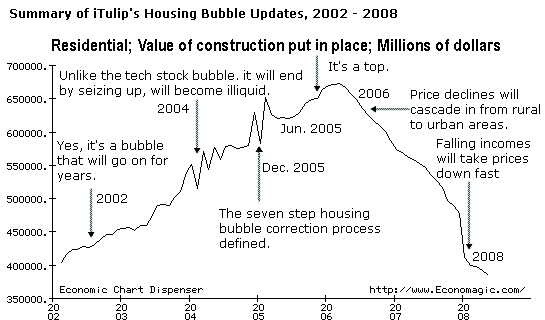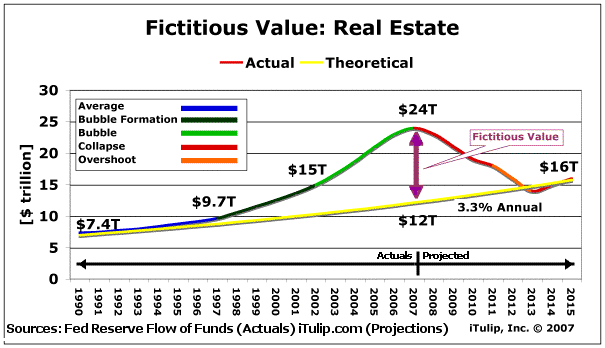Re: Why Only Fools Think the Bottom Is In
Good stuff Nero3. Very thought provoking, and with fresh ideas. I think you are spot on in many respects.
Housing in some major markets within the US for instance, will level off this year IMO in nominal terms and may even get a little relief bounce. Some anecdotal information - I am seeing foreclosures in my old central neighborhood of San Diego now, where an average 2 bedroom condo rents for $1300 / mo, and in the one case I'm looking at, the foreclosure has been "marked down" by an impatient bank (even some non-foreclosures, sold by long time owners get marked down this far!) to $180,000. That is maybe the price for a decent home in some smaller city in the central states of America, but most certainly not in one of America's premier beach-towns in Southern California.
What can you buy with a measly, devalued $180K US B0nars today in the center of an old historic neighborhood in San Diego? Try this: Corner lot, three to four bedrooms, prime location near all amenities including the central city trolley station, only fifteen blocks from San Diego State University - all in the absolute center of the city This neighborhood saw $650 prices at the top in 2005-2006, so this property represents a 72% discount. Meanwhile a "one size fits all" iTulip orthodoxy states flatly that "all housing is sitting on flim flam fundamentals and must go down for years more". Do we detect a discrepancy here perhaps?
It might be a good idea to remember, that before there was iTulip, most of use were accustomed to using (and trusting!) our two eyes, for the simple practice of running some comparables and understanding when values are so totally destroyed, that they represent a sharp anomaly to their market context. iTulip provides compelling analysis, with a superb strategic interpretation of the macro. But it's possible that by taking every single one of it's positions, and applying those conclusions religiously to every instance (housing has many years to fall, stock market ditto) is a misuse of this website's intelligence because it is unreasonable to assert that the same rule can apply to the same extent everywhere.
As SeanO has pointed out elsewhere, you can look around in markets that you know well, know like the back of your hand, and understand that when you are able to buy a home in a premium beach-resort city, second largest city in California and one of the densest urban regions in the country, with severe geographic limits on all four sides, and by putting $36,000 down, obtain a mortgage of $900 per month for a three bedroom detached home, you have well and truly discovered some solid ground at the bottom of this housing collapse and there are some outstanding bargains lying around with no bidders.
What does this mean? It means you could buy such a property, rent it out to a former two bedroom condo dweller who's been paying $1300 per month, and you'd have a $400 per month positive cash flow, plus the market security of being able to offer a 3 bedroom detached home in a market where people paid the same money for a two bedroom condominium. At which point presumably, iTulip's indignant orthodox priests would insist that the rental price of condos must imminently plunge down to arbitrage this discrepancy. But the residential apartment complex rates in this city have been absolutely unaffected by any market turmoil, and have barely dipped a fraction. To suggest they must collapse to meet these low house prices is simply nonsense.
The fact that such assertions applied to the equities markets draw so much scorn at iTulip should make iTulipers firmly decide to think a little more "iconoclastically". iTulip's a wonderful beacon. But anyone here who relapses into a state of indignation when a newcomer has the temerity to suggest there may be some real bargains in the equities - such people may benefit from a little more willingness to challenge whether all of iTulip's current prognoses could possibly be right to the same degree, when applied everywhere. By definition, such an assertion would be absurd.
Good stuff Nero3. Very thought provoking, and with fresh ideas. I think you are spot on in many respects.
Housing in some major markets within the US for instance, will level off this year IMO in nominal terms and may even get a little relief bounce. Some anecdotal information - I am seeing foreclosures in my old central neighborhood of San Diego now, where an average 2 bedroom condo rents for $1300 / mo, and in the one case I'm looking at, the foreclosure has been "marked down" by an impatient bank (even some non-foreclosures, sold by long time owners get marked down this far!) to $180,000. That is maybe the price for a decent home in some smaller city in the central states of America, but most certainly not in one of America's premier beach-towns in Southern California.
What can you buy with a measly, devalued $180K US B0nars today in the center of an old historic neighborhood in San Diego? Try this: Corner lot, three to four bedrooms, prime location near all amenities including the central city trolley station, only fifteen blocks from San Diego State University - all in the absolute center of the city This neighborhood saw $650 prices at the top in 2005-2006, so this property represents a 72% discount. Meanwhile a "one size fits all" iTulip orthodoxy states flatly that "all housing is sitting on flim flam fundamentals and must go down for years more". Do we detect a discrepancy here perhaps?
It might be a good idea to remember, that before there was iTulip, most of use were accustomed to using (and trusting!) our two eyes, for the simple practice of running some comparables and understanding when values are so totally destroyed, that they represent a sharp anomaly to their market context. iTulip provides compelling analysis, with a superb strategic interpretation of the macro. But it's possible that by taking every single one of it's positions, and applying those conclusions religiously to every instance (housing has many years to fall, stock market ditto) is a misuse of this website's intelligence because it is unreasonable to assert that the same rule can apply to the same extent everywhere.
As SeanO has pointed out elsewhere, you can look around in markets that you know well, know like the back of your hand, and understand that when you are able to buy a home in a premium beach-resort city, second largest city in California and one of the densest urban regions in the country, with severe geographic limits on all four sides, and by putting $36,000 down, obtain a mortgage of $900 per month for a three bedroom detached home, you have well and truly discovered some solid ground at the bottom of this housing collapse and there are some outstanding bargains lying around with no bidders.
What does this mean? It means you could buy such a property, rent it out to a former two bedroom condo dweller who's been paying $1300 per month, and you'd have a $400 per month positive cash flow, plus the market security of being able to offer a 3 bedroom detached home in a market where people paid the same money for a two bedroom condominium. At which point presumably, iTulip's indignant orthodox priests would insist that the rental price of condos must imminently plunge down to arbitrage this discrepancy. But the residential apartment complex rates in this city have been absolutely unaffected by any market turmoil, and have barely dipped a fraction. To suggest they must collapse to meet these low house prices is simply nonsense.
The fact that such assertions applied to the equities markets draw so much scorn at iTulip should make iTulipers firmly decide to think a little more "iconoclastically". iTulip's a wonderful beacon. But anyone here who relapses into a state of indignation when a newcomer has the temerity to suggest there may be some real bargains in the equities - such people may benefit from a little more willingness to challenge whether all of iTulip's current prognoses could possibly be right to the same degree, when applied everywhere. By definition, such an assertion would be absurd.
Originally posted by nero3
View Post




 will cut it off and send the money elsewhere. ej said years ago into infrastructure/energy and that's about right, too.
will cut it off and send the money elsewhere. ej said years ago into infrastructure/energy and that's about right, too.
Comment